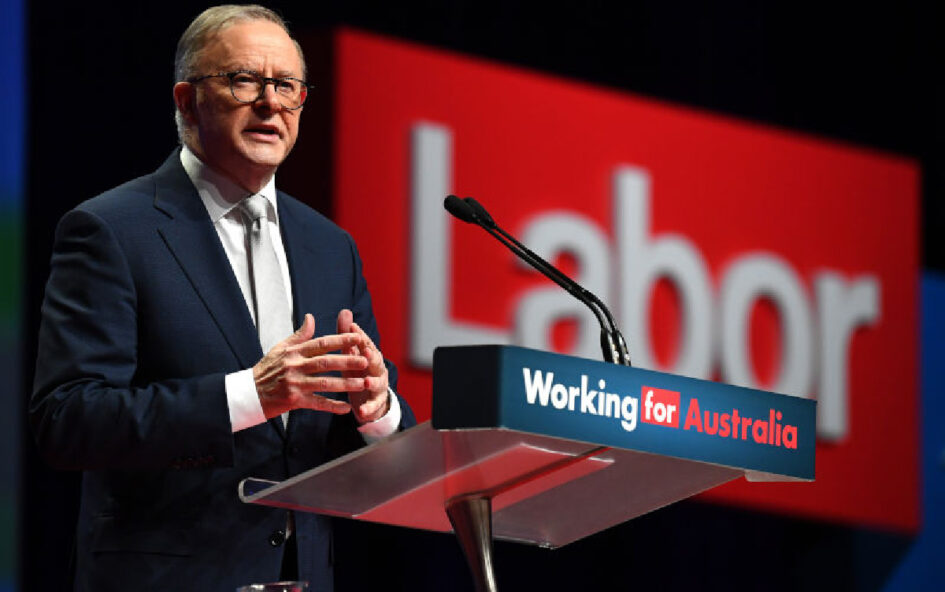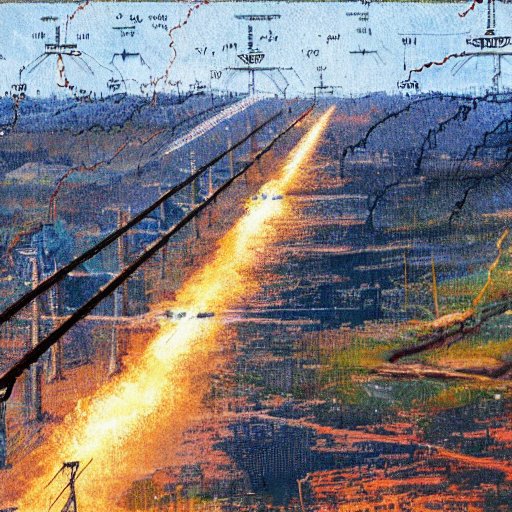By Allan Patience: Pearls and Irritations
Hard core supporters of Australia’s alliance with America – in Australia, the USA, and in the UK – were no doubt thrilled by Anthony Albanese’s full-throated defence of the AUKUS deal at the ALP’s national conference in Brisbane. It was as much playing to them that his speech was directed as it was to the conference delegates and Labor supporters at home.
Albanese asserted that his government had absolutely made the right decision to sign up to a deal that the UK and the US had confected to blindside the naïve Scott Morrison – a deal to serve their interests, not Australia’s. They played Morrison like a fiddle, and now Albanese has taken the easy road, appeasing them to avoid being undermined by the Americans and the Murdoch monsters. He was running scared.
In his obviously rehearsed speech – the most impassioned we’ve heard from Albanese for some time – he insisted he had arrived at his decision only after taking advice from the experts. Those people have reminded him, he assured the audience, that because Australia is an “island nation”, therefore we simply must have a sophisticated submarine fleet to guarantee its security.
Moreover, it had to be a nuclear-powered submarine fleet in order to range silently beneath the waves, undetected by the enemy.
The Eternal Adviser
Just who those advisers were, and what their advice was, remains a bit of a mystery. However, it is unsettling to know that some of them were the very advisers who pulled the wool over Morrison’s eyes when he plunged Australia into the whole AUKUS mess. They remain in their posts under Albanese and Marles, but they retain links with their Liberal mates. Why has Albanese kept them on since his 2022 election victory. His side-kick Marles has much to answer for.
Albanese’s speech swept aside advice from highly-qualified experts who have identified many devastating flaws that make clear it is a totally dud policy. The most obvious one is the cost, especially when the Australian economy is struggling.
Then there is the time-line factor: the arrival of the nuclear powered fleet is years, perhaps decades away. What happens in the meantime? Moreover, it is likely that the submarines will be obsolete by the time they are due to be delivered. The 368 billion dollars cited as the cost is just the beginning. It is very likely to more than double if the deal does go ahead. And the bulk of those billions will be going to subsidise American and British shipyards, not Australia’s.
And then, of course, there is the probable outcome that the submarines won’t happen at all.
Time Flows Eternal
The question of Australian sovereignty has always been an issue, from the signing of the ANZUS treaty in 1951. Ever since, this country’s war history has been inextricably tied into the US’s reckless and persistent warmongering. This has come at a huge cost to Australia: soldiers’ lives have been lost; many veterans who survived remain seriously traumatised and neglected; the financial expense of that warmongering has held Australia’s economic development back; and our relations with our geopolitical neighbours have been seriously compromised. Australia looks very like America’s puppet to many in our region and globally. We are America’s puppet.
Albanese tried to sugar coat the bitter AUKUS pill by promising doubters in the union movement – as well as mounting numbers of critics among the party membership – that it would mean lucrative jobs for at least 20,000 Australian “union” workers. It would underpin, he intimated, a revival in Australia’s manufacturing sector. It was all pie in the sky nonsense, but the controlling ALP faction bosses made sure that Albanese won the day “on the voices.”
What was not mentioned was the problem of nuclear waste that will occur from the reactors onboard the never-never submarines. This is a problem that will require action, sooner than later, if the submarine deal goes ahead.
Calculation
The sub-narrative of Albanese’s speech was his cynical calculation that appeasement over the AUKUS deal is essential for him and his government; it is the only way to stay in power. This highlights the grim fact that the ALP – and Albanese himself – no longer believe in themselves and their core values. They have been seduced by being in office, into believing that they should hasten slowly so as not to frighten the horses. This relieves them of the responsibility to inspire the horses!
But it is a false argument that says that the harsh realities of power politics demand a puny form of pragmatism, a total surrendering of time-honoured principles, as the only way to hold power for a reforming government. That is a furphy: there is a way to bridge the gap between principle and practice in politics.
It requires inspiring and visionary leadership. This means that true leaders need a rock solid moral core to underpin their political agendas. They are not back-sliders; they push forward bringing the majority of voters with them.
Moral Cores
There were real glimpses of morally inspired leaderships under great Labor leaders like John Curtin, Ben Chifley, Don Dunstan, Gough Whitlam, Bob Hawke, and Paul Keating. They took risks by clearly and patiently explaining to voters how their visions for a better Australia should work. They listened to the rank and file.
They stood up to reactionary and fearful voters who preferred a stagnant status quo to an enlightened and liberating future. They had rock solid moral cores.
They were able to lay the foundations for Indigenous land rights, women’s rights, Medicare, and other important reforms that reactionaries in the Liberal-National coalition have not been able to destroy.
Albanese’s politics are morally hollow. He is an apparatchik, not a statesman. His monotone vocal delivery only amplified the confected passion in his Labor conference speech. At the end of the day he is nothing more than a Labor machine man, ensuring the numbers are sorted before he takes to centre stage.
The Mirage
He pretends to tolerate those who oppose his stand on AUKUS, but is prepared to dispense with them in order to pursue his politics of appeasement. It’s his (and Marles’) way or no way, end of story.
Australian politics is at a critical moment in its history. The timidity of the Albanese government is matched by the ruthless negativism of the Dutton opposition. The political culture from which both sides operate harks back to Australia in the 1950s when, as Donald Horne pointedly remarked, the country was led by second-rate people. It still is.
Australia should be led by first-rate, morally inspiring, truly visionary leaders. There is light at the end of the tunnel. A younger generation of leaders is emerging. Some were at the Labor conference, voicing their concerns. Albanese ignored them, but it will be to his peril.
Dr Allan Patience is an honorary fellow in political science in the University of Melbourne.






